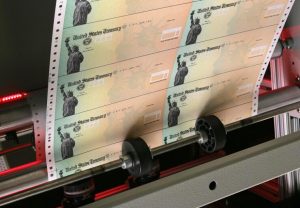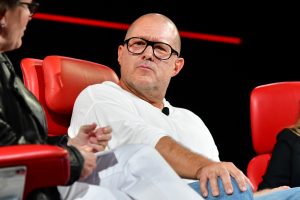Indeed today did have special meaning. While the origins may have been from American politics, the reality is Canada does have a unique personality that is based on the British parliamentary system, whereas American is more akin to the French republic. Republics are driven by personality, while Canada and the British parliamentarian system is just that- a system which transcends individuals. Attempts to instill identity politics, Trudeau type personality politics fail both from average citizens and more importantly from within their own party notwithstanding which party.
As Andrew Coyne stated so eloquently today the root of the current personality crisis from south of the border is one which ultimately proves the Kingdom system works:
Perhaps this might come to be regarded as the moment we left our adolescence – when we developed a more mature relationship with our past. In the heat of the current existential crisis, it was remarkable how many people, even those not usually inclined to support the monarchy, turned instinctively to the King to speak in our defence; how instantly right it felt when it was announced that he would be delivering the Throne Speech. In our gut we knew that what was needed at this moment was a bit of gravitas, the kind that comes with a thousand years of history: a gravitas that was always a part of us, but which we had suppressed.
Thank you King Charles III for todays visit and, maintaining the institution by reading the Throne speech yet leaving within 24 hours controversy free and a confident brave Canada.
These pieces below, especially from Andrew reflect well on the growth of Canada and the strength of the Kingdom.
——————————————————–
——————————————————-
This was the moment Charles became King of Canada, and Canada his kingdom
Andrew Coyne
The original idea at Confederation was that this country would be called the Kingdom of Canada: like the United Kingdom, the Kingdom of Sweden, and so on.
But there was concern this would antagonize the Americans, so instead we settled on the “Dominion of Canada” – a fine title in its own right, but one that eventually fell into disuse, a discarded relic of our past. Because that’s what we do in this country: forget our past, when we are not erasing it, as if the very act of remembrance were something shameful.
Or, perhaps, it is what we did.
Much has been made of the King’s speech to Parliament, and rightly so. The symbolism was hard to miss. While much of the speech was unremarkable – a bland recapitulation of the Carney government’s core agenda, already familiar from the election campaign – and none of it was earthshaking, what was significant was not what was said but who said it. This was the Sovereign of Canada, speaking in defence of his realm.
He was not merely asserting Canada’s sovereignty, in the face of repeated attempts to undermine and indeed mock it by (we have become numb to the enormity of this) the President of the United States. He was, by virtue of who he is and what he represents, reminding us of what it is based on.
We are, he was saying, not merely a place, or a line on a map. We are a people, a serious people with a proud history, who have built, from some of the most forbidding territory on Earth, a society that is rightly regarded as one of the finest achievements of human statecraft; who have made great sacrifices in defence of their own freedom, and others’; and who have thereby earned the right to take their place among the nations of the Earth. Those who talk of annexing us – or of breaking us apart – would do well to consider just what kind of people they would be tangling with.
And at the core, inescapably, of that history, and that society – that nation – is the Crown. It is the foundation of our system of law and government. It is the symbol of continuity and stability, and yet also the symbol of reform and reinvention: it cannot have escaped notice how many of the rituals surrounding the speech are rooted in the long and ultimately successful struggle to tame the monarchy, such that it became not the enemy of democracy but its chief defender, against the depredations of those in temporary possession of power.
Hence the importance, real and symbolic, of separating the offices of head of government and head of state: as it has been said, when the prime minister bows to the King, he is really bowing to us. The King is the personification of the state, or better to say the humanization of it: it remains striking that at the apex of our system of government we have placed not an entity or an abstraction, but … a family.
And yet for decades it seemed we felt a need to distance ourselves from the monarchy, as if out of some fit of adolescent insecurity: as if acknowledging where we had come from somehow stood in the way of becoming what we might become. Perhaps this was understandable, in the immediate aftermath of imperial rule. But long after the Statute of Westminster, this petulant attitude remained. Our history was something either to be ignored, or to be mined for grievances, but never to be celebrated, as something of which, for all our many sins, we can be proud. And then we wondered why, cut off from our roots, we failed to grow.
Perhaps this might come to be regarded as the moment we left our adolescence – when we developed a more mature relationship with our past. In the heat of the current existential crisis, it was remarkable how many people, even those not usually inclined to support the monarchy, turned instinctively to the King to speak in our defence; how instantly right it felt when it was announced that he would be delivering the Throne Speech. In our gut we knew that what was needed at this moment was a bit of gravitas, the kind that comes with a thousand years of history: a gravitas that was always a part of us, but which we had suppressed.
Perhaps, indeed, this might be seen as the moment we finally patriated the monarchy, as an emotional and not merely a constitutional inheritance; when we got over the idea that monarchy was all right for places like Britain or Sweden or Japan or The Netherlands, but too grand for little old us; when we became, at last, the Kingdom of Canada.
—————-
Slurce Globe and Mail
For many new Canadians, King Charles III’s visit carries a special, personal meaning
King Charles greets members of the public along Wellington Street in Ottawa on Tuesday. New Canadians were among the thousands who turned up to welcome the King.Justin Tang/The Canadian Press
The Lefter family never expected to swear allegiance to a king.
Until a few years ago, Yulia Lefter and her two daughters were living their lives in Berdycziw, Ukraine. And then the war broke out. The family was split up. The daughters, aged 12 and 15, were sent to safety, and the parents were left behind.
“I kept thinking,” Ms. Lefter said, “‘The war will be over tomorrow, tomorrow, tomorrow.’” Instead, Ottawa is where the family finally reunited, just five months ago. Canada has become their new home.
So, as she stood in the bright sunshine Tuesday morning, just steps away from where King Charles III and Queen Camilla were expected to appear, Ms. Lefter wanted to deliver a message personally for the royal couple whom she now calls King and Queen.
The historic visit has been met, from coast to coast, with a range of responses: polite indifference in some parts, near-ecstatic excitement in others. But for many newcomers to Canada, the visit landed with a special kind of poignancy.
King Charles III and Queen Camilla were greeted by a large crowd as they toured a farmer’s market on the first day of their visit to Ottawa.
Among the thousands who greeted the royal couple in Ottawa this week were new Canadians – new to the country, many of them new even to the idea of a monarchy. They brought with them stories from around the world that illustrate what the Crown represents to them: for some, powerful memories of a painful past; for others, a promise, a symbol of hope for the future.
By around 9 a.m. on Tuesday, a large crowd had already gathered along Ottawa’s Wellington Street. This was the route the King and Queen were expected to take as part of the royal procession ahead of the King’s delivery of the Speech from the Throne.
Perched along the fence, awaiting the King and Queen, was Brian Alan Fernandes. Mr. Fernandes came to Canada in 2023 from India, another member of the Commonwealth.
To the 28-year-old Mr. Fernandes, the royal couple represents a connection to his own past – to his own home. During his childhood in Mumbai, Mr. Fernandes’s mother loved the Royal Family. She’d always wanted to meet Queen Elizabeth. But the closest she ever got was a visit to Britain, where she posed with a cardboard cutout.
Mr. Fernandes, who drove to Ottawa from his home in Toronto, had managed to meet Queen Camilla the day before, at Ottawa’s Lansdowne Park. Shaking her hand, he said, felt like fulfilling a promise to his mother. He was braving the crowds – and the blistering sun – for a second day, hoping to meet the King, too.
Coyne: This was the moment Charles became King of Canada, and Canada his kingdom
“I’m her eyes,” Mr. Fernandes said, referring to his mother. “That’s the way it has to be.”
Just a few feet away, Claudia Casadiego stood waiting, too. The noise around her was building – the excitement of the crowd was growing, and in the background were the sounds of a brass band playing the national anthem.
Ms. Casadiego, 52, said she only began learning about the history of Canada, and the history of the Commonwealth, in her ESL classes shortly after arriving in Canada from Colombia last year. “It felt like real-life history,” she said.
As she spoke, the cheers grew louder. There were military officers, then the horses of the RCMP Musical Ride. And then there were the King and Queen, in the state landau.
Ms. Casadiego stood frozen. She found herself unexpectedly moved, she said. It was the briefest moment. But, for Ms. Casadiego, it crystallized something.
“It feels like I’m a part of the history now too,” she said. As of that moment, she said, “I feel Canadian too.”
King Charles and Queen Camilla receive warm reception in Ottawa ahead of Throne Speech Tuesday
Several minutes later – after the royal couple had already passed – Yvonne Kwok arrived looking flustered. When she realized she had missed the moment, her face fell.
Ms. Kwok grew up in Hong Kong in the 1990s, before the Chinese takeover – when the city was still a British colony. She looks back at that time with a sense of longing. To Ms. Kwok, the Crown represents democracy. Hope. “I learned freedom when I was young,” she said.
She was hoping for a chance to see the King up close. To pass on a message of her own. “I really wanted to tell him, ‘I’m from Hong Kong,’ ” she said. “I think he would understand.”
Back by the Senate building, the Lefter family was still standing by the fence, quietly celebrating.
Ms. Lefter and her younger daughter, Solomia, were each wearing a vinok – a Ukrainian wreath made up of bright pink, red and yellow flowers. They’d draped along the fence a Ukrainian and a Canadian flag.
The royal couple had come within about 30 feet of them, Ms. Lefter said. Not close enough to meet, but close enough for the King and Queen to see them. To see their flag. There were tears in her eyes. “Just wow,” she said. “Wow. Wow.”
By showing the flag to the royal couple, she said, she’d sent the message she came to deliver.
“Canada and the U.K. have supported us,” she said. “We wanted to say thank you.”
Sign up for our redesigned Morning Update newsletter.
Start your day with context and insight on the biggest stories shaping our lives, written by Danielle Groen
Explore newsletters



